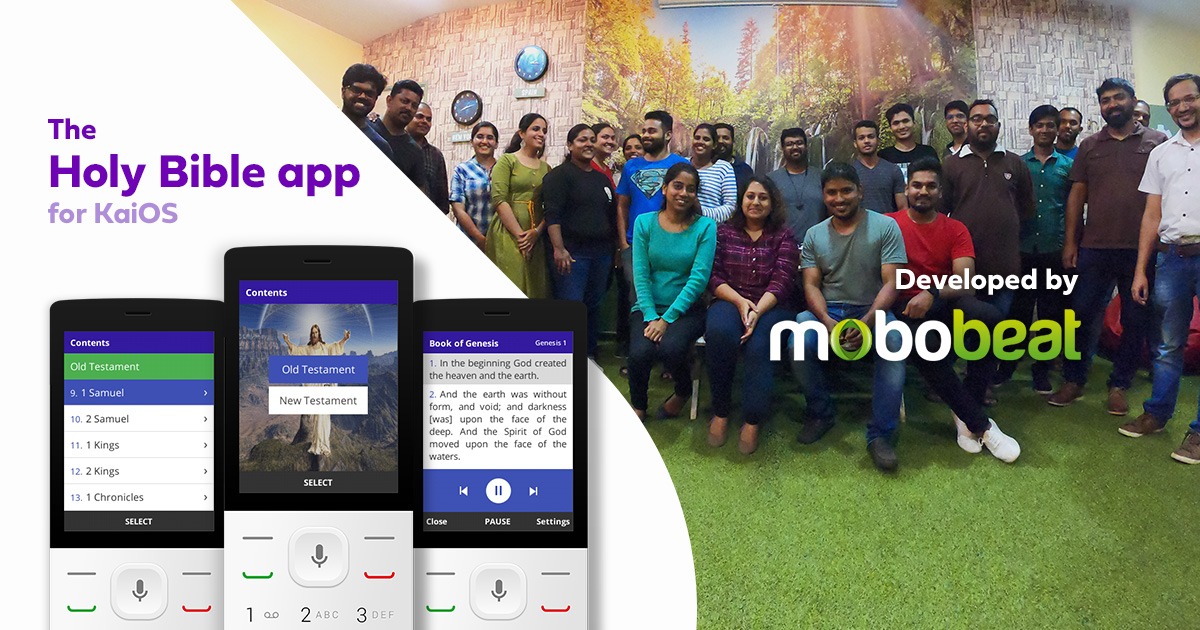
We have no doubt that bringing the mobile internet to developing countries has the potential to change lives. But the benefits do not come from internet access alone. Here at KaiOS, we love partnering with companies and developers who are passionate about bringing information, education, and opportunities to people in underserved markets.
One of these companies is Mobobeat. By applying their existing development skills to web-app development, Mobobeat created a Bible app for KaiOS. Their dedication to reaching millions of users in emerging countries — combined with the support we provided — made this project a success.
About Mobobeat
Mobobeat is a mobile performance network with offices in Madrid, Spain, and Goa, India. They help developers promote their iOS, Android, and now KaiOS apps around the world.
After learning about KaiOS’s role in making the mobile internet accessible to millions and noticing the success of the JioPhone in India, Mobobeat saw an opportunity to develop new apps for the platform.
Because the KaiStore functions much like other app stores, Mobobeat was confident that their previous app development experience could be applied. With the support of KaiOS’s team, they could easily tap into new markets.
How Mobobeat decided on The Holy Bible app
Worldwide, Bible apps are extremely popular. As of 2018, one Bible app had been installed on over 350 million devices globally. Between 2017 and 2018, that same app’s daily active users rose by 27%.
Considering the book’s popularity, Mobobeat decided to bring a Bible app to developing countries through affordable smart feature phones running KaiOS. With prices as low as $17, these phones are accessible to millions of people in developing countries. Once they get connected, apps like the Holy Bible can keep them engaged and strengthen their faith.
The journey to developing The Holy Bible app
Developing for KaiOS was a new experience for Mobobeat. To successfully build The Holy Bible app, the team first had to learn how to optimize apps for smart feature phones.
The average Android app is 15MB, while the KaiStore’s average app size is 1-2MB, with a maximum restriction of 6MB. Three of Mobobeat’s engineers relied heavily on the KaiOS Developer Portal to learn how to build an app for the KaiOS environment and used the KaiOS Simulator for app testing, debugging, and verification.
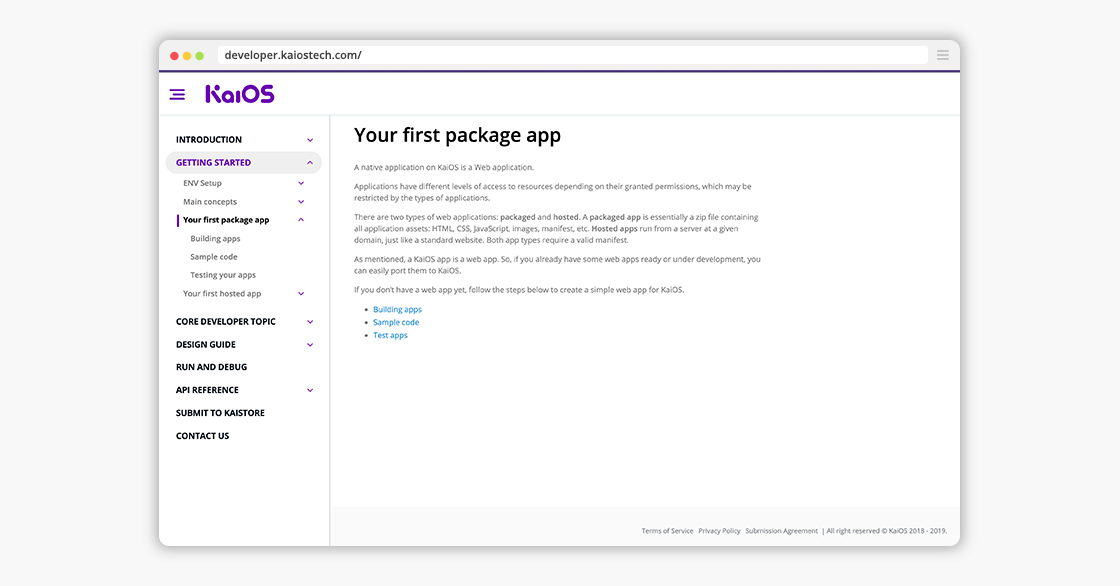
After the initial version of the app was ready, KaiOS employees Harshdeep and Thomas reviewed it and suggested improvements centered around optimizing the UI and icon size for smart feature phones. With the help of the KaiOS Developer Portal and the benefit of simpler coding languages, such as HTML, CSS, and JavaScript, final adjustments were completed within a week. Once the app passed a final round of KaiOS QA, it was listed on the KaiStore.
Developing an app with users in mind
In order to make The Holy Bible app as accessible as possible, Mobobeat added features to address a variety of needs, abilities, and potential obstacles, such as intermittent internet access and limited digital literacy.
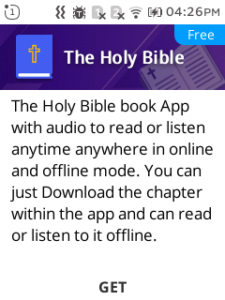
Audio feature
Compared to developed countries, many of KaiOS’s target markets have lower literacy rates. South Asia, for instance, is home to 68% of the world’s illiterate adults. There is also a significant gender gap. In West and South Asia, adult females are nearly six times less likely to have basic reading and writing skills than their male counterparts.
Africa has a similar story: In Guinea, for example, the literacy rate is only 30%, with 38% of males being literate, compared to 23% of females.
The Holy Bible app’s narration feature enables users to listen to content both online and offline, much like an audiobook. Audio narration not only makes the content available to a wider audience, but it also promotes equality by giving women with limited literacy an equal opportunity.
Currently, the app includes full audio versions of the Bible in English, German, Spanish, French, and Italian.
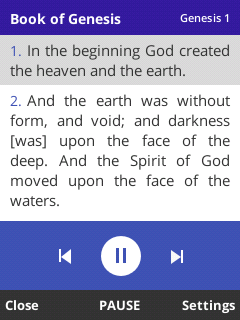
Offline reading
Slow and/or intermittent internet remains a problem in many developing countries. As of July 2019, only 7% of mobile connections in Sub-Saharan Africa were 4G. Although 3G connections are slowly becoming more available, 2G networks are still the most prominent throughout the continent.
Because slow networks can lead to a disrupted reading experience, Mobobeat believed that an offline reading option was essential. The first chapter is pre-loaded into the app, so users can begin reading as soon as they open it. Each time the reader moves onto a new chapter, the full chapter will download automatically so that the reader will not have to wait for each new page to load. Downloaded chapters also remain available even when the device is not connected to the internet, so users can easily continue reading while offline. In areas where internet connections are often intermittent, this valuable feature ensures a smooth reading experience.
Simple user interface (UI)
For many newly connected consumers, smart feature phones are a completely new experience. Although the device may feel similar to a basic feature phone, seemingly simple tasks such as downloading and opening apps can involve a learning curve.
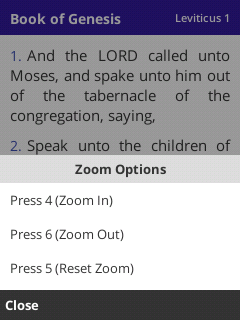
Mobobeat aimed to design an app that would be easy-to-use for consumers who are still building their digital literacy skills. They worked with KaiOS to simplify features within the app and make navigation more intuitive. They also used the KaiOS simulator tool to test how the app would appear on the smaller screens of smart feature phones.
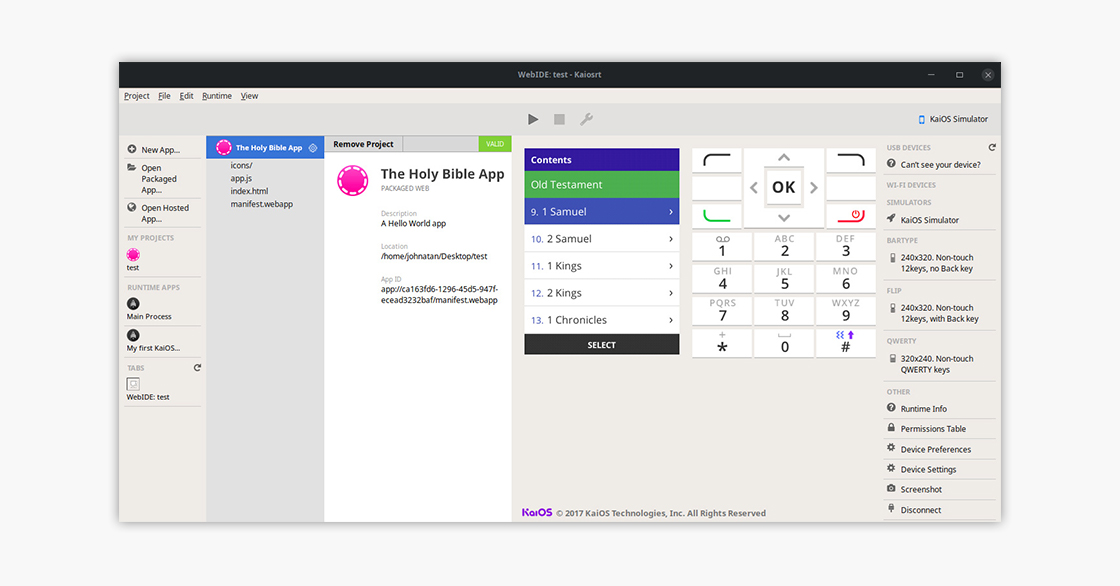
High-impact ad placement
User experience was considered when deciding on monetization strategies as well. Mobobeat chose to only display ads as pop-ups or between chapters so that readers would not be disrupted by full page ads.
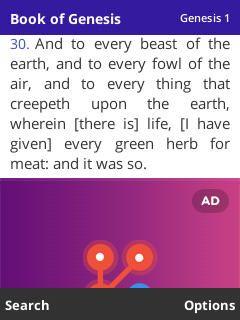
Future plans for The Holy Bible app — and beyond
The Bible app project is just getting started. Mobobeat’s developers will continue to update new versions with features such as daily readings, reflections for the day, highlights, bookmarks, and note-taking. They are also planning a function to share verses on social media and SMS. Mobobeat is also exploring opportunities to make the app available in other languages and adding video options where users can watch videos of the parables.
The positive development experience has motivated Mobobeat to continue their partnership with KaiOS. They plan to develop five to six additional apps on KaiOS. Keep an eye out for the next app, which will go live in the KaiStore soon! If you are interested in developing apps for KaiOS, check out our Developer Portal to learn how to get started.
So i’m seeing all these Google apps on KaiOS and have for a while,y’all could maybe talk to Tracfone to provide such apps maybe?
We are always working with device manufacturers. However, I can’t guarantee that OEM will implement a particular feature or an app.
I am so happy to see a Bible app created for KaiOS. This has the potential to put God’s word into the hands of so many people. Having an audio Bible is so great for those who may not be able to read well. Thank you Mobobeat for your hard work and dedication to doing God’s work! I’m proud of you!
I’ve been dreaming of someone to build a Bible app for KaiOS for about a year truthfully. You did it!
Thank you for your positive feedback 😉
Great! I have check mobobeat app this one is amazing.
Thank you for the positive feedback!
I have checked it but I think you must include some more graphics in this.